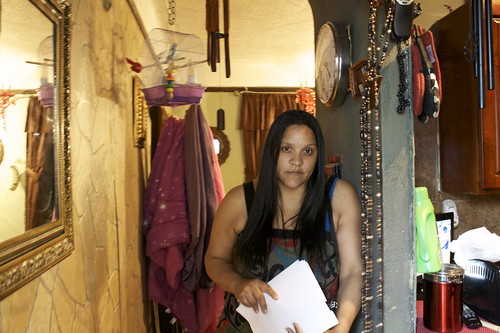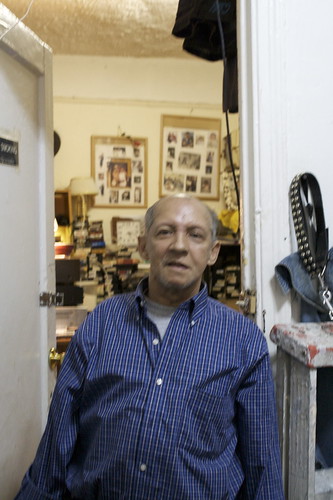 Rachel OhmJanette Brown holds a copy of the letter she and six other residents sent to the state Attorney General in an effort to fight against the purchase of 390 East Eighth Street, a low-income housing building, by Tower Brokerage.
Rachel OhmJanette Brown holds a copy of the letter she and six other residents sent to the state Attorney General in an effort to fight against the purchase of 390 East Eighth Street, a low-income housing building, by Tower Brokerage.For 36 years Carlos Baez, 63, has called 390 East Eighth Street home. The two bedroom apartment that he shares with his niece on the first floor of the building holds his large collection of VCR tapes, which includes every Whoopi Goldberg and Charles Bronson movie ever made. Because he used to be the super of the building, Baez’s apartment is bigger than most and is conveniently located on the first floor, the perfect spot because his 14-year-old dog, Little, has arthritis and can barely walk up stairs.
And yet he’s thinking of moving.
On Feb. 25, 390 East Eighth Street, a dedicated low-income housing building, was sold to Tower Brokerage, an East Village real estate developer with plans to put in market-rate apartments.
The HDFC, the tenant-owned and operated corporation that currently owns the building, finally conceded to the sale seeing no way out from a financial debt that accumulated during the years the building was being run by a non-profit called Interfaith Adopt-a-Building.
The building “owes the city about $1.2 million in water bills and taxes,” said Robert Perl, president of Tower Brokerage. “This sale is the only way to pay the city funds.”
The building has a long and troubled history, dating back to 1982 when it was converted from city-owned public housing to a Housing Development Fund Corporation (HDFC), and because of city policy also became part of a development run by the not-for-profit organization called Interfaith Adopt-A-Building.
Hyder Binjameel, 53, is president of the HDFC and has lived in the building since 1988. He says he remembers poor management under Interfaith. He says that the non-profit, which has since dissolved, was milking the HDFC for money and allowing the building to accumulate debt to the city.
“Our building’s basement was a dump site,” he said. “There was no door to the building; there was no intercom; there was no elevator. The roof was leaking every day and repairs were never made. I don’t know where the money was going.”
In early 2000, Interfaith ran into financial difficulties and could not pay taxes to the city. The building owed roughly $500,000, according to Mr. Binjameel, and HDFC inherited 286 building violations from Interfaith when it dissolved. He estimates that each of those violations cost around $1,000 to repair. Then there was the interest to pay on the tax debt. During repairs a worker fell and sued for $3 million — further contributing to the financial woes of 390 East Eighth.
Residents met and decided to hire a lawyer in 2004. Every resident was asked to contribute $1,500 to pay for the lawyer, who told them one option would be to sell the building to a private developer themselves.
By 2010, the city had transfered the property into the Third Party Transfer Program, a decision that means the building will be foreclosed in April if the outstanding real estate taxes are not paid. HDFC tried to get a tax abatement, but according to Mr. Binjameel, had no luck going through the New York City Council.
“We sat down with everyone in the building and told them listen there may be some people who do not want to sell and if you don’t you have full rights to live in a rent-controlled apartment,” said Mr. Binjameel. “People who want to cash their apartments can cash them- that’s the way to benefit the most.”
Last month Tower Brokerage, an East Village real estate broker, began offering tenants roughly $200,000 per apartment— a sum of money that would be a windfall for the low-income tenants living there.
So far 29 out of 36 residents have taken the offer.
Janette Brown, 39, is one of six tenants who didn’t want to take the money or sell her apartment. Last week they filed complaints with the state Attorney General, who has the ability to deny the sale if it can be proved that it violates stipulations outlined in business corporate law.
“I was mad because I didn’t want to sell like that,” said Ms. Brown. “I want to sell with a title and ask for what I want and not what the lawyer is saying. Whatever they are going to give, that’s what we have to take.”
Ms. Brown has lived in the building her entire life. She grew up on the first floor; her sister lives on the second and she now lives on the third floor with her daughter. They share a single bedroom.
“The board told me I should sell because the building has a lot of debt,” she said. “I don’t want to sell and I don’t have a husband or anywhere to go.”
She said that when the building became HDFC she never received a shareholder’s certificate. She says she feels uncomfortable selling without a title to her apartment and that if she were to sell she would want to make an offer— not just take the price Tower offers— even if it is well above what the apartment might be worth.
Mr. Binjameel says he and most of the other tenants feel they have no choice. He said that if they do not sell to Tower the city will sell their apartments for them or transfer the building to a third party non-profit such as Interfaith. He is afraid that another non-profit will not take care of the building and take advantage of tenant’s money.
He is looking for a house in Staten Island, even though he works construction in Manhattan and his family does not want to leave.
“Do I have a choice?” he said. “We have only one choice if we want to live here, which is to pay that debt to the city. So we are sacrificing our space and giving it to the guy that can pay. I don’t want to live here if the city gives the building to a third party.”
City housing laws will not allow the current tenants to become homeless. Low-income residents of the building who want to stay can keep their rent-controlled apartments.
“I want my daughter to be raised in Manhattan,” said Ms. Brown. “This is where I like it and this is where I want to stay.”




